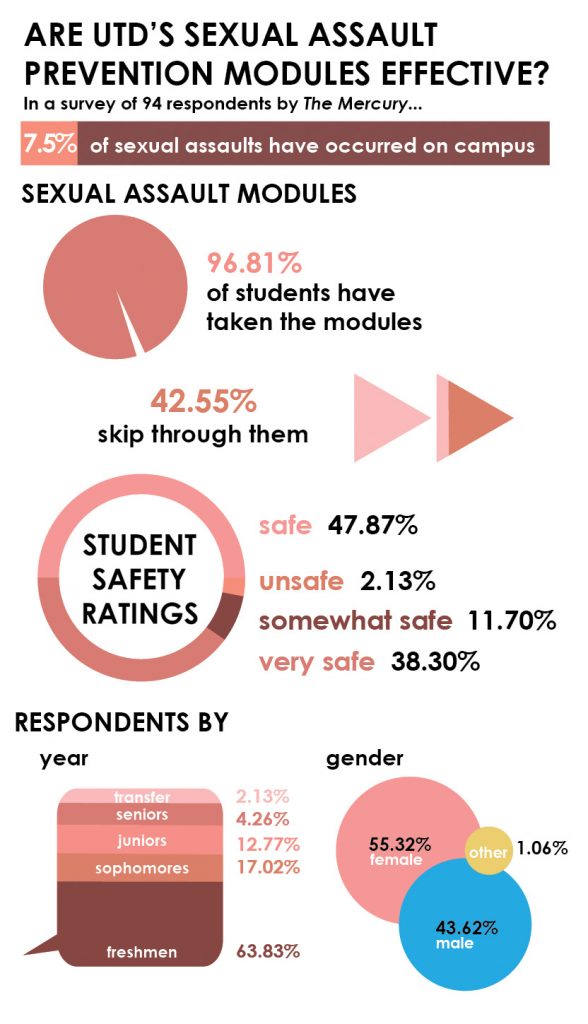UTD requires every new student to complete a series of web-based sexual assault prevention modules. A survey of 94 students conducted by The Mercury revealed 86 percent of participants do not believe the modules are effective in educating students about sexual misconduct.
UT System implemented the sexual assault prevention course to inform and educate incoming students about sexual misconduct and consent in a variety of settings. While failure to complete the course results in a hold placed over a student’s account, the penalty was not always in place.
“The first year we started was back in 2014,” Kacey Sebeniecher, the director of the Student Wellness Center, said. “But there was not a consequence until the fall of 2016. For those two years, it was strongly suggested. We always sent out reminders, but we had nowhere near a 100 percent completion rate.”
Incompletion of the module, however, does not prevent students from registering for classes.
Psychology freshman Alexandria Ramirez said the course was engaging, but the length of it deterred her from paying attention. 42 percent of respondents in The Mercury’s study said they skipped through the course.

“I think because it was so long, people weren’t reading it,” Ramirez said. “The incentive was to skip through it. Everyone’s been telling me that. I know a guy who failed it 4 times, but how do you fail that? It’s common sense. But he didn’t care he failed it, he cared because he couldn’t see his grades.”
The course, designed by education technology company EverFi, takes 45 minutes to complete.
“Being a student before, I do think the module is too long,” Sebeniecher said. “We don’t create the modules, EverFi does. There are certain topics that they have to hit, as per federal guidelines, and that’s why it’s so long. But they are actively working on shortening it.”
Mattieu Evans, a psychology freshman, said he felt the timing and the presentation of the modules was inconvenient.
“I felt like we could have done them after we got here, after everyone moved in and everything,” he said. “Having someone talk to you about it in person is much more engaging than doing it online.”
Of the 94 respondents, 31 percent said that an in-person seminar would be more effective than the module.
The decision to implement the web-based module system was set by UT System. Sebeniecher said the idea of adopting an in-person seminar was ideal but likely not feasible. She said the SWC presents multiple workshops throughout the year on topics other than sexual misconduct, making it difficult to create in-person sexual assault prevention seminars without potentially axing other initiatives.
“The module is ineffective on their own,” Sebeniecher said. “(The module is) only one way to educate. That, coupled with our presentations and events, is effective. We don’t rely solely on the module and say that our students are properly educated just through that. We do believe there needs to be more.”
A separate UT System initiative called Cultivating Learning and Safe Environments overlaps with the sexual assault prevention course. Released in March of 2017, the empirical study investigated the prevalence of sexual misconduct on campus.
“Anonymous initiatives like the CLASE and the sexual assault modules are actually one of the only times survivors will disclose,” Sebeniecher said. “But the thing is, we will never know 100 percent of the time.”
Besides the regularly scheduled programs, classes and student organizations can request to schedule an informational presentation from the SWC.
“I do hope those modules are making a positive effect on students, in knowing what resources are available and that it is okay to come forward, and whom they can come forward to,” Sebeniecher said.

















